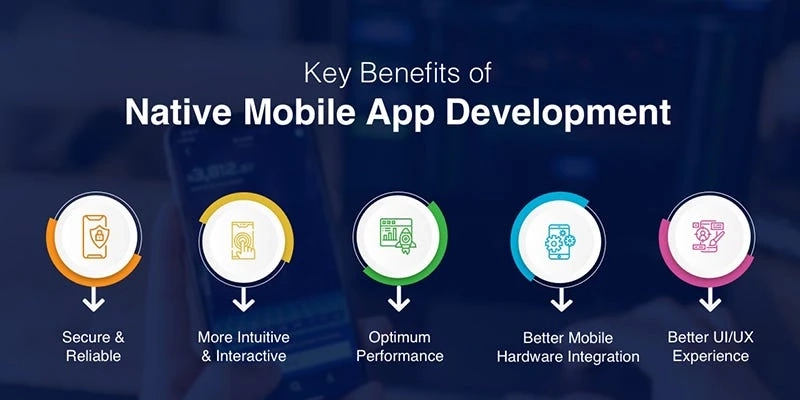Native developers use the same programming languages used to create the SDKs for the two platforms: Android(Kotlin, Java) y iOS(Swift, Objective-C). This makes it possible for experts to quickly review the documentation and select a better fix for the issue. Developers constantly track operating system updates, build applications with these changes in mind, and are experienced in troubleshooting issues within the two platforms.
Top-notch Performance
Native apps are agile and responsive because they are built for a specific platform and compiled using its core programming language and APIs. As a result, the app runs much more efficiently.
Intuitive User Interface and User Experience
Native applications are the protagonists in UI UX. By working in a native environment, developers have access to its UI/UX components. This allows them to create stunning visual effects, such as attractive complex out-of-the-box animations and smooth scrolling.
Seamless System Integration
Adopting a mobile-native development approach grants developers unrestricted access to device and operating system features such as the microphone, camera, audio and video capabilities, NFC, location services, fingerprint sensors, and phone information. The absence of this functionality in middleware frameworks poses no challenge for mobile native development. Collaborating with a leading mobile app development company in USA ensures that your app leverages the full spectrum of native capabilities, delivering a seamless and immersive user experience while maximizing the potential of mobile technology.
High Security
Mobile native development allows you to use system mechanisms and algorithms to encrypt and store data, implement SSL certificates, and restrict access to your data. Regular updates for iOS and Android ensure security from cyber threats.
Scalability and Improvement
Native apps tend to be more scalable due to the multiple APIs and tools available that the iOS and Android platforms offer. Technically, there are no restrictions on how developers can work with a new app and add new features in the future.
When to Choose to Develop Native Mobile Applications
When your app constantly relies on the device's camera, GPS, and other built-in tools and features.
You would like to offer your audience the most amazing user interface, which is especially important when your company introduces a new app.
When mobile applications run in the background for extended periods, such as those for playing media, managing alarms, or sending reminders, they often engage in frequent interactions with the operating system, resulting in increased battery drain. Native applications excel in this scenario by enabling efficient management of application components without the need for additional layers. Leveraging top-tier mobile app development services ensures the implementation of optimized solutions that mitigate battery drain while maintaining seamless functionality, thereby enhancing the overall user experience.
When Development Speed Matters
When there are many integrations with different SDKs or services, and the final roadmap is unknown, which in the future may lead to adding extra functionalities.
When applying low-level OS components or C/C++ libraries such as Web-RTC.
The application must be deployed natively when the core feature is developed via cross-platform (Unity).
When you need to publish your application only on one platform.
When system security is vital, as well as compatibility with permanent operating system updates.



